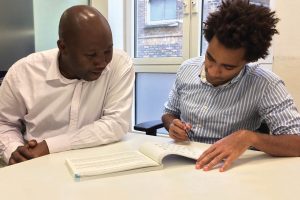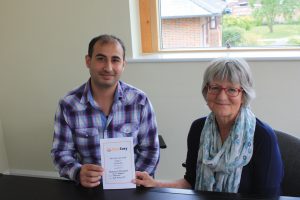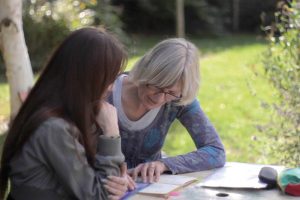Ginny was responsible for running the Shannon Trust’s prisoner-to-prisoner reading programme where she saw how a confidential, one-to-one approach encouraged prisoners to seek support and successfully learn to read.
Many were deeply ashamed that they couldn’t read. Some carried bad memories of school. They feared returning to a classroom setting, reawakening old feelings of failure.


The programme is supported by volunteers offering one-to-one support
But by working instead with a dedicated coach, this supportive and trusting bond developed the prisoner’s confidence and a motivation to complete the course.
Recognising there was no similar provision for adults in the community, Ginny set up the first Read Easy group in Dorset, using volunteers to work one-to-one with new readers.
Read Easy UK was established the following year as an umbrella body to support other volunteers wanting to set up groups in their communities.
There are now 36 affiliated Read Easy groups across England, with another 13 in development, involving over a thousand volunteers. A number of these groups are supported by Rotary clubs.
With more than 2.4 million adults in England who can barely read or can’t read at all, Ginny acknowledged there is so much more to do to address the need.
She said: “Cuts in government funding since 2010 mean that in many areas there are now no adult education classes for those with the lowest literacy levels.
“We feel that our one-to-one approach is much more effective than such classes, because most adults are too embarrassed to join a group.
“We’re excited to have created a model that gives people just the support they need, but we now need more volunteers to help roll it out. Without our amazing volunteers who set up and run our local groups, we couldn’t operate.”
Steve Peckham is the Team Leader for Read Easy Wyre Forest in Worcestershire, which has been supported financially by Rotary clubs in Bewdley and Kidderminster.
They were established in 2018 with Rotary support, recruiting ten reading coaches from a variety of backgrounds.
“Adults who struggle with reading do not read articles, leaflets, posters or social media items posted about help with reading,” explained Steve.
Cuts in government funding since 2010 mean that in many areas there are now no adult education classes for those with the lowest literacy levels.”
“Mainly, they hear by word of mouth from loved ones, from advice centres, libraries and colleges; from agencies like Job Centres, housing association job coaches and representatives from other voluntary and statutory agencies.
“It takes courage, after perhaps hiding your inability to read for decades, to make that call to get help.”
The Read Easy Wyre Forest team uses a room at a local Sainsbury’s store, also a church, a theatre office, and office space at two libraries.
Reader and coach meet up for two half hour sessions per week. “It’s the one-to-one format that is so attractive for new adult readers,” explained Steve. “Many of them would avoid any group setting, either though lack of confidence or too many memories of failure and possibly ridicule at school.”


A graduate receiving their Read Easy certificate
A phonics-based approach to learning to read is used by working through a series of five manuals. The ‘Turning Pages’ manuals have been produced for adults by the Shannon Trust and are backed up by suitable reading books.
The service is free, with readers moving at their own pace. There is no limit on the time it takes to ‘graduate’, but most readers take around 12 to 15 months; some longer, some shorter.
For adults who struggle to read, the Coronavirus pandemic has left them feeling more isolated, and in need of Read Easy’s service, than ever before.
Home-schooling children has been a big enough challenge for many parents with good literacy skills, but for those who cannot read their seven-year-old child’s story book, or understand communications from teachers, it has proven impossible.
It takes courage, after perhaps hiding your inability to read for decades, to make that call to get help.”
Steve admitted that COVID-19 arrived just as they were getting into their stride in a second full year of operation. That brought a halt to face-to-face reading sessions.
However, different Read Easy groups around the country have travelled through the restrictions in different ways. Some coaches and readers have progressed using Zoom, Facetime, WhatsApp or even good old-fashioned telephone calls.


Read Easy groups around the country have travelled through the restrictions in different ways
David, one reader from Plymouth, revealed that had he not continued with his sessions during the lockdown, not only would he have forgotten everything he had learned, but he probably would have given up all together.
Instead, he has completed two training manuals in the last six months, with all sessions taking place through WhatsApp.
Read Easy Wyre Forest’s working model is very lean. Its annual running costs are around £3,000 a year, depending on numbers of reading manuals bought and coach training sessions held.
With use of donated premises and coaching being carried out by volunteers, they have no major overheads.
Steve added: “Our group has been lucky to have the vital support of both Kidderminster and Bewdley Rotary Clubs, and we hope that continues.
“Once we can operate safely again, our team is ready to bounce back, helping to change the lives of adults who struggle with their reading.”


























































